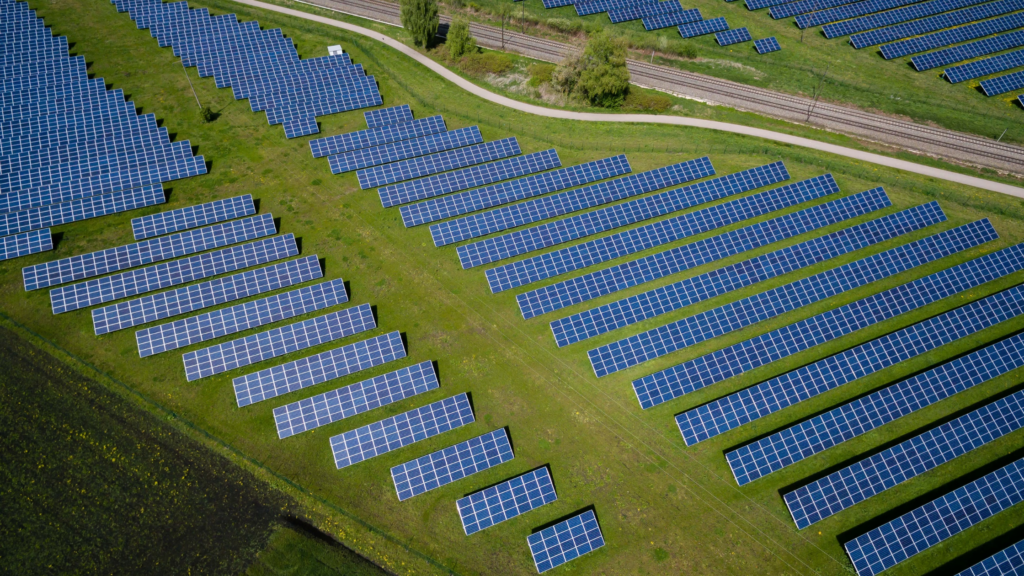Amid U.S. policy shifts on ESG and climate initiatives, the ongoing trade war and threats to Canada’s energy independence, there’s been a lot of discussion about boosting energy sovereignty. The calls to build energy infrastructure have inevitably led to talk of east-west pipelines.
In March, an open letter from 14 CEOs representing the four largest pipeline companies and 10 largest oil and natural gas companies urged Canadian political leaders to facilitate investment in building new oil and gas infrastructure.
Of course, all of this comes on the heels of rapidly accelerating climate change and the hottest year on record; 2024 was the first time global temperatures reached more than 1.5°C above pre-industrial levels, a number once deemed an uncrossable threshold.
“Today’s headwinds will not stop the energy transition, but it will slow down if investors are staying on the sidelines.”
Stephanie Tsui, Chief Sustainability Officer / Portfolio Manager, Genus
On top of that, a record amount of forest was lost in 2024 due to catastrophic fires. Yet, despite the growing devastation, fossil fuel production and consumption continues to grow, and emissions reached all-time highs last year – with no end in sight. Current global policies have us on target to hit 2.7°C above pre-industrial levels by 2100.
As Canadians brace for another climate change summer, investors must not lose sight of long-term climate risks – and the opportunities the clean energy transition presents. “We all know that our climate emergency has not changed,” says Stephanie Tsui, Chief Sustainability Officer and Portfolio Manager at Genus. “Today’s headwinds will not stop the energy transition, but it will slow down if investors are staying on the sidelines.”
Investing in renewable energy is needed more than ever

As the demand for energy increases globally, Canada isn’t the only nation scrambling to meet it. The digital economy has resulted in high energy requirements worldwide, and Generative AI has taken energy requirements to a whole new level. A single ChatGPT query, for example, uses 2.9 watt-hours of energy, as compared to a Google search, which uses about 0.3 watt-hours. And the more fossil fuels we burn, the more we accelerate global warming – driving up demand for cooling and further increasing energy consumption. It’s a vicious cycle.
“The renewable energy transition is a mega trend, and the current political agenda is not going to change it in the long run.”
Stephanie Tsui, Chief Sustainability Officer / Portfolio Manager, Genus
Fortunately in Canada, renewables already make up a large percentage of our energy usage: 70% of our electricity comes from renewable sources and 82% comes from non-greenhouse gas emitting sources such as solar, hydro, wind and nuclear power. As we ramp up energy production – renewables are increasingly being used to help meet growing energy demands, (though the sector is not without volatility). “Renewable energy is economically viable and the lead time to production is much shorter than building pipelines,” Tsui says. “And the truth is, big data centres and IT companies tend to prefer to rely on renewable sources despite what’s happening politically. They need all types of energy to satisfy the demand.”
Renewable energy has been touted as a force for energy sovereignty in Canada. And globally, it will continue to grow as the energy transition progresses. “The renewable energy transition is a mega trend,” Tsui says, “and the current political agenda is not going to change it in the long run.”
An opportunity for investors: financial realignment

As sustainability loses political traction in the U.S., the sentiment has influenced the financial sector as well, causing banks and asset managers to drop their decarbonization targets and leave climate alliances. Many are quietly closing or rebranding their ESG funds so that they’re less overtly in opposition with current political headwinds.
Consequently, in 2024, the pace of growth in investment in the low-carbon energy transition slowed significantly – from 24-29% annual growth over the past three years, to 11% last year. Bloomberg’s Energy Transition Investment Trends report for 2025 noted that “global energy transition investment would need to average $5.6 trillion each year from 2025 to 2030, in order to get on track for global net zero by 2050.” That’s a steep increase from the $2.1 trillion invested in 2024.
For green investors, there is an opportunity here – and a silver lining. With asset managers dropping ESG investments, it’s becoming clearer who remains truly values-aligned. “It’s a good time to really screen out companies that are genuine versus the ones that were just riding the bandwagon,” Tsui says. “Many banks and companies are still facing pressure from their customers that they have to do something. Not all of them are abandoning their sustainability efforts, they’re just quieter about them right now.”
Sustainable investing has never been more important, and we’re here to help

For sustainable and impact investors, the key in this shifting landscape is to stay true to your values – in spite of political headwinds. “Impact investors and those who are focused on sustainability and renewable energy have to really stay focused on how to best allocate their capital to make an impact,” Tsui says.
While volatility is par for the course when it comes to equities investments, Tsui says it is possible to ride out the storm and mitigate risks during times of uncertainty with the addition of fixed income products such as impact and green bonds. “These can diversify both your risk and the potential impact you can make by supporting environmental and social initiatives – including the development of renewable energies.”
For sustainable and impact investors, now is the time for disciplined conviction, not retreat. While others pivot for short-term optics, values-aligned investors may benefit over the long term by staying the course – and investing in a greener future.
Get started today with our values-based investment services.
Impact investments involve financial risk, and returns are not guaranteed. Investors should consider their financial goals, risk tolerance, and consult a financial professional before investing. To determine if impact investing aligns with your financial goals, speak with a qualified advisor.
This material is for informational purposes only and does not constitute investment advice or a recommendation to buy or sell any specific securities or investment products. Investing involves risk, including possible loss of principal. Investors should consult with a licensed financial advisor to determine whether any investment strategy aligns with their individual risk tolerance, investment objectives, and financial circumstances.
References:
Li, S. (2025, June 3). Trump 2.0: US climate policy in retreat. Oxford Economics. https://www.oxfordeconomics.com/resource/trump-2-0-us-climate-policy-in-retreat/
- Mantin, B., Dresner, M., & Pan, X. (n.d.). Canada is now in a trade war with the U.S. — here’s what you need to know to prepare for it. The Conversation. https://theconversation.com/canada-is-now-in-a-trade-war-with-the-u-s-heres-what-you-need-to-know-to-prepare-for-it-250989
- Krugel, L. (2025, March 19). Energy sector CEOs call on Ottawa to use emergency powers to speed up key projects. CBC. https://www.cbc.ca/news/canada/calgary/energy-ceos-open-letter-1.7487793
- Why is everyone talking about pipelines? Here’s everything you need to know. (2024, April 23). iPolitics. Retrieved June 4, 2025, from https://www.ipolitics.ca/2025/04/23/why-is-everyone-talking-about-pipelines-heres-everything-you-need-to-know/
- Energy, T. (n.d.). BUILD CANADA NOW: An open letter to the leaders of Canada’s political parties. https://www.tcenergy.com/open-letter-to-party-leaders
- WMO confirms 2024 as warmest year on record at about 1.55°C above pre-industrial level. (2025, January 10). World Meteorological Organization. https://wmo.int/news/media-centre/wmo-confirms-2024-warmest-year-record-about-155degc-above-pre-industrial-level
- Frost, R. (2025, May 21). World lost a record-shattering amount of forest in 2024, fuelled by climate change-driven wildfires. Euronews. https://www.euronews.com/green/2025/05/21/world-lost-a-record-shattering-amount-of-forest-in-2024-fuelled-by-climate-change-driven-w
Thomas, J. (2024, November 13). Fossil fuel emissions hit record high in 2024, raising climate target concerns. Innovation News Network. https://www.innovationnewsnetwork.com/fossil-fuel-emissions-hit-record-high-in-2024-raising-climate-target-concerns/52758/
- Ripple, W. J., Wolf, C., Gregg, J. W., Rockström, J., Mann, M. E., Oreskes, N., Lenton, T. M., Rahmstorf, S., Newsome, T. M., Xu, C., Svenning, J., Pereira, C. C., Law, B. E., & Crowther, T. W. (2024). The 2024 state of the climate report: Perilous times on planet Earth. BioScience. https://doi.org/10.1093/biosci/biae087
Growth in global energy demand surged in 2024 to almost twice its recent average. (2025, March 24). IEA. Retrieved June 4, 2025, from https://www.iea.org/news/growth-in-global-energy-demand-surged-in-2024-to-almost-twice-its-recent-average
- Trindade Pereira, I., & Yilmaz, M. C. (2025, March 17). ChatGPT, Deepseek & Co: How much energy do AI-powered chatbots consume? Euronews. https://www.euronews.com/my-europe/2025/03/17/chatgpt-deepseek-co-how-much-energy-do-ai-powered-chatbots-consume
- Energy Fact Book, 2024-2025: Clean power and low carbon fuels : Canadian Centre for Energy Information. (2025, May 30). https://energy-information.canada.ca/en/energy-facts/clean-power-low-carbon-fuels
Jones, J. (2025, April 28). Renewable energy touted as force for sovereignty in Canada’s north. The Globe and Mail. https://www.theglobeandmail.com/business/article-renewable-energy-touted-as-force-for-sovereignty-in-canadas-north/
- The energy world is set to change significantly by 2030, based on today’s policy settings alone. (2024, October 24). IEA. Retrieved June 4, 2025, from https://www.iea.org/news/the-energy-world-is-set-to-change-significantly-by-2030-based-on-today-s-policy-settings-alone
- Five of Canada’s Big Six banks quit global climate alliance. (2025, January 20). Financialpost. https://financialpost.com/fp-finance/banking/bmo-first-canadian-bank-leave-un-climate-alliance
- Ellmen, E. (2025b, June 3). ‘ESG tourists’ are leaving, but sustainable funds are still growing in Canada. Corporate Knights. https://www.corporateknights.com/category-finance/esg-tourists-are-leaving-but-sustainable-funds-are-still-growing-in-canada/
- BloombergNEF. (2025, May 22). Global investment in the energy transition exceeded $2 trillion for the first time in 2024, according to BloombergNEF report – BloombergNEF. BloombergNEF. https://about.bnef.com/insights/finance/global-investment-in-the-energy-transition-exceeded-2-trillion-for-the-first-time-in-2024-according-to-bloombergnef-report/
- BloombergNEF. (2025a, May 22). Global investment in the energy transition exceeded $2 trillion for the first time in 2024, according to BloombergNEF report. BloombergNEF. https://about.bnef.com/insights/finance/global-investment-in-the-energy-transition-exceeded-2-trillion-for-the-first-time-in-2024-according-to-bloombergnef-report/











